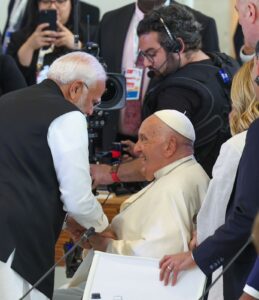In an era marked by profound social, political, and environmental challenges, leadership that transcends national boundaries and addresses global issues is crucial. Two such figures who have made significant impacts on the world stage are Pope Francis, the leader of the Roman Catholic Church, and Narendra Modi, the Prime Minister of India. Despite their distinct roles and divergent backgrounds, both have emerged as influential change managers, advocating for transformative agendas in their respective domains.

Pope Francis: The Moral Compass
Since his election in 2013, Pope Francis has revitalized the papacy with a focus on humility, inclusivity, and social justice. He has prioritized issues such as poverty, climate change, and the plight of refugees, emphasizing the need for compassion and action in addressing global inequities. His encyclical Laudato Si’ (2015) is a groundbreaking document that links environmental stewardship with social justice, calling for a collective effort to combat climate change and protect the planet for future generations.
Pope Francis has also been a vocal advocate for interfaith dialogue and peacebuilding. He has engaged in unprecedented outreach to other religious leaders, fostering a spirit of collaboration and mutual respect. His historic meeting with the Grand Imam of Al-Azhar, Ahmed el-Tayeb, in 2019, and the subsequent signing of the Document on Human Fraternity, highlight his commitment to promoting harmony among different faiths.
Through his actions and teachings, Pope Francis has not only reinvigorated the Catholic Church but also positioned it as a pivotal player in addressing some of the most pressing global issues of our time.
Narendra Modi: The Political Reformer
Narendra Modi, who became Prime Minister of India in 2014, has pursued an ambitious agenda aimed at modernizing the nation and elevating its status on the global stage. His economic reforms, digital initiatives, and infrastructural projects reflect a vision of a self-reliant and technologically advanced India.
One of Modi’s significant contributions is the Make in India initiative, which seeks to transform India into a global manufacturing hub. This program has attracted foreign investment and generated employment opportunities, contributing to the nation’s economic growth. Additionally, his Digital India campaign aims to enhance digital infrastructure, increase internet connectivity, and promote digital literacy across the country, thereby bridging the digital divide.
On the international front, Modi has actively sought to strengthen India’s diplomatic relationships and expand its influence. His foreign policy approach, characterized by pragmatic engagement and strategic partnerships, has enhanced India’s role in global affairs. Notably, Modi’s government has played a crucial role in advocating for climate action, aligning with global efforts to combat climate change through initiatives like the International Solar Alliance.
Convergence of Leadership Styles
While Pope Francis and Narendra Modi operate in different spheres, their leadership styles share commonalities. Both leaders emphasize the importance of inclusive growth and sustainable development. Pope Francis’ call for ecological conversion resonates with Modi’s environmental initiatives, such as the Clean India Mission (Swachh Bharat Abhiyan), which aims to improve sanitation and hygiene across the country.
Moreover, both leaders understand the power of symbolism and direct communication. Pope Francis’ gestures of humility, such as washing the feet of prisoners, and Modi’s personal engagement with citizens through platforms like Mann Ki Baat, his radio program, underscore their commitment to connecting with people on a personal level.
Challenges and Criticisms
Despite their achievements, both leaders face significant challenges and criticisms. Pope Francis has encountered resistance within the Church, particularly from conservative factions wary of his progressive stance on issues like LGBTQ+ rights and clerical celibacy. Similarly, Modi’s tenure has been marked by controversies, including concerns over religious intolerance, human rights, and the erosion of democratic institutions.
Pope Francis and Narendra Modi exemplify how leaders can drive change by addressing the needs and aspirations of their people while navigating complex global landscapes. Their efforts to foster inclusivity, sustainability, and international cooperation reflect a broader vision of a more equitable and interconnected world. As global change managers, their legacies will likely be defined by their ability to inspire and implement transformative solutions in an era of unprecedented challenges.































